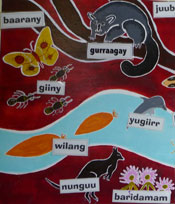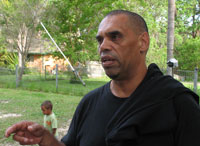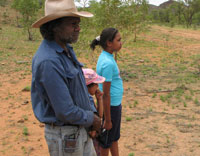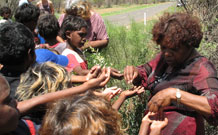Episode 5: Australia
Director: Paul Rickard
“if we go into Dhanggati territory, we are expected to speak Dhanggati…We don’t go in there and say you’re gonna speak Gumbaynggirr because that’s just disrespectful. The language belongs to the land and white people have (a) different concept of that. They don’t understand that.” - Michael Jarrett, Gumbaynggirr Language Teacher
 In the last two hundred years, Australia has suffered the largest and most rapid loss of languages known to history. About 250 Aboriginal languages existed in Australia prior to colonization. Today, there are only about 20 in constant use. Aborigine communities are now reviving and maintaining their languages with the assistance of linguists, interpreters and translators. In Nambucca Heads, the Guymbaynggirr people work to revive a near extinct language, while in Alice Springs, vibrant languages learned at home are struggling to survive government policies and cultural prejudices.
In the last two hundred years, Australia has suffered the largest and most rapid loss of languages known to history. About 250 Aboriginal languages existed in Australia prior to colonization. Today, there are only about 20 in constant use. Aborigine communities are now reviving and maintaining their languages with the assistance of linguists, interpreters and translators. In Nambucca Heads, the Guymbaynggirr people work to revive a near extinct language, while in Alice Springs, vibrant languages learned at home are struggling to survive government policies and cultural prejudices.
Part 1
 In the coastal town of Nambucca Heads in New South Wales, the Guymbaynggirr people are reviving their near extinct language. Michael Jarrett, like many his age, did not grow up speaking the language but he's worked hard to learn it as an adult. Now he works as a language teacher in the local schools and teaches adults through the Muurrbay Aboriginal Language and Cultural Co-operative. With a dedicated team of linguists, community members and local researchers, the Muurrbay Co-operative has taken major strides in Gumbaynggirr language revitalization, including the recent launch of a dictionary.
In the coastal town of Nambucca Heads in New South Wales, the Guymbaynggirr people are reviving their near extinct language. Michael Jarrett, like many his age, did not grow up speaking the language but he's worked hard to learn it as an adult. Now he works as a language teacher in the local schools and teaches adults through the Muurrbay Aboriginal Language and Cultural Co-operative. With a dedicated team of linguists, community members and local researchers, the Muurrbay Co-operative has taken major strides in Gumbaynggirr language revitalization, including the recent launch of a dictionary.
Part 2
“The land and the language are interconnected. I want my children to learn about both worlds, to survive in town and to understand the land.” - John Kemarre Cavanagh, Eastern Arrernte speaker
 In the central Australia area of Alice Springs, vibrant languages learned at home are struggling to survive government policies and cultural prejudices. Aboriginal people were barred from Alice Springs until 1964. Their children were taken away from their families and forced to attend mission schools. Today they are facing new challenges like the Intervention Act, which permits government interventions in private life that are not tolerated in other parts of the country.
In the central Australia area of Alice Springs, vibrant languages learned at home are struggling to survive government policies and cultural prejudices. Aboriginal people were barred from Alice Springs until 1964. Their children were taken away from their families and forced to attend mission schools. Today they are facing new challenges like the Intervention Act, which permits government interventions in private life that are not tolerated in other parts of the country.
John Cavanagh, a fluent Eastern Arrernte speaker, is part of the generation that was forced to attend mission schools. We follow him as he shares his traditional knowledge of the land and his hopes for his children.
Part 3
 “In Central Australia, we speak our language, but we must continue to teach the language to our children, just like how it was spoken by our grandparents.” - Lorna Wilson, Coordinator of the Language & Culture Centre, Institute of Aboriginal Development
“In Central Australia, we speak our language, but we must continue to teach the language to our children, just like how it was spoken by our grandparents.” - Lorna Wilson, Coordinator of the Language & Culture Centre, Institute of Aboriginal Development
Several languages are strong in Central Australia and students often start school with a strong grasp of their mother tongue. Yipirinya an alternative school in Alice Springs provides a basic education in the three major indigenous languages of the area. Students also learn English to help them survive in mainstream Australia. The Institute for Aboriginal Development in Alice Springs assists adults who only speak an Aboriginal language by providing interpreting services to help them deal with government and social requirements. They help their clients when they have to deal with the courts, social services and hospitals.

